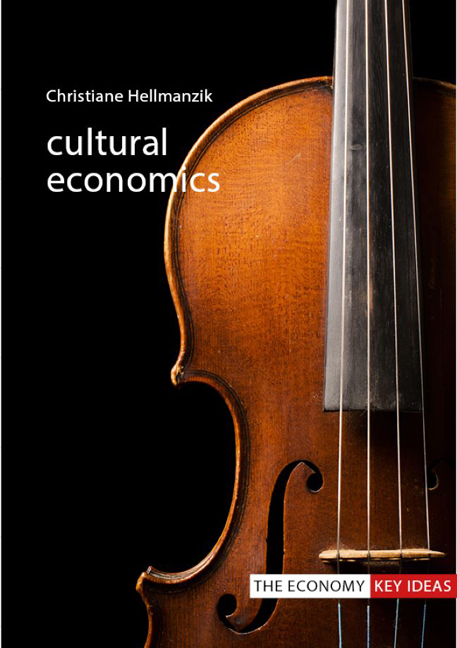Book contents
- Frontmatter
- Contents
- Acknowledgements
- 1 Introducing cultural economics
- 2 Markets, prices and agents
- 3 Society and culture: public provision and institutional aspects
- 4 Demand for culture
- 5 Artists, superstars and creativity
- 6 Quality in the arts and culture
- 7 The organization of cultural industries
- 8 The internet’s impact on cultural sectors
- 9 Globalization’s impact on cultural sectors
- 10 Conclusion
- References
- Index
1 - Introducing cultural economics
Published online by Cambridge University Press: 20 December 2023
- Frontmatter
- Contents
- Acknowledgements
- 1 Introducing cultural economics
- 2 Markets, prices and agents
- 3 Society and culture: public provision and institutional aspects
- 4 Demand for culture
- 5 Artists, superstars and creativity
- 6 Quality in the arts and culture
- 7 The organization of cultural industries
- 8 The internet’s impact on cultural sectors
- 9 Globalization’s impact on cultural sectors
- 10 Conclusion
- References
- Index
Summary
By way of starting this book, let us point out the obvious: culture and economics are in many ways contradictory, if not antithetical. Is it not the mere essence of art, and culture more generally, that its beauty lies in the eye of the beholder? Its true value is hard to grasp and goes way beyond the price paid at the box office or the bookshop. When we think about the artist's perspective, is art and, more precisely, the spark of genius that results in the Mona Lisa, Oliver Twist or “Bohemian Rhapsody” not the result of some divine inspiration that cannot possibly be subject to such banal forces as the market? How many musicians, writers or painters take great pride in their independence of the market? One might think that most of the cultural avant-garde of the 1960s and 1970s were inspired by that very sentiment when we think of Woodstock, the Sex Pistols or Pink Floyd.
On the other hand, we have the likes of Banksy and Damien Hirst, whose claim to fame, as well as their works of art, is to toy with eclipsing existing definitions of art and its market. Hirst's Shark in a Tank sold for US$8 million in 2004 and, although graffiti and tagging are illegal, Banksy's graffiti of a Girl with a Balloon sold for £37,000 in 2007; and, more recently, a framed version of the very same image self-destructed by means of an in-built shredder, at the point that it was auctioned for US$1.4 million. For both these modern artworks we might be forgiven for thinking that they are a far stretch from a Van Gogh oil painting. Similarly, with the advent of the internet many musicians have adjusted the way they produce and market their art, as evidenced by the many artists who have since been discovered on YouTube or Soundcloud. And what about George R. R. Martin, whose novels inspired the Game of Thrones television series? Surely his writing process was influenced by the market he was catering for.
These examples capture several mechanisms at play. One is the evolution of our definition of what constitutes culture. The other is the interaction between the artist and the audience (or consumer) via ever-changing platforms, or what economists would simply call the market.
- Type
- Chapter
- Information
- Cultural Economics , pp. 1 - 12Publisher: Agenda PublishingPrint publication year: 2020



